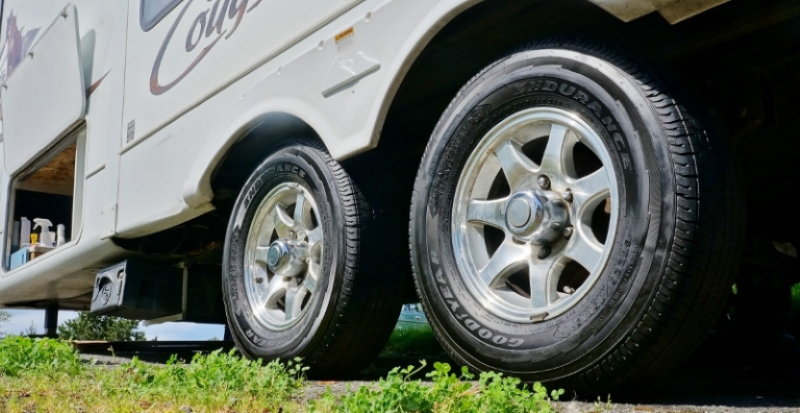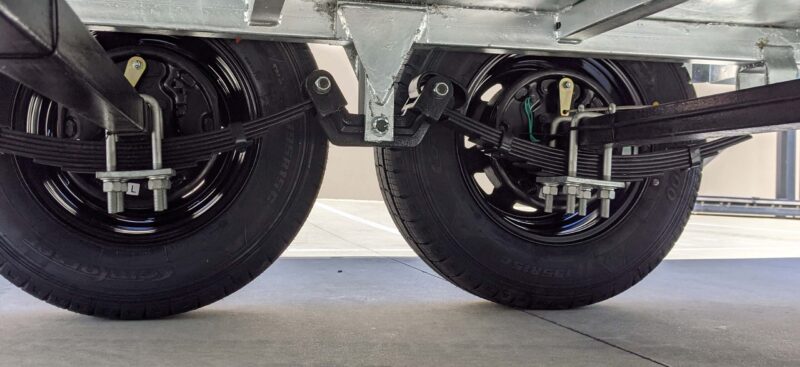One of the drawbacks of hauling that shiny, beautiful travel trailer across the country is the tires refuse to remain shiny and beautiful. Just like your vehicle, change them regularly. But how often should travel trailer tires be replaced? Do they sit on the same timeline as your vehicle’s tires?
Bald tires are a nuisance and a safety hazard, especially in the rain, snow, sleet, or poorly paved roads. Even a small travel trailer is a pretty extensive weight burden on both your vehicle and the trailer itself. Sure, tires are expensive, but it’s all a part of the package.
Think about it like this – a good set of tires keeps you safe on the road. While replacing travel trailer tires is expensive, a blowout or a slip-and-slide accident on the road is exponentially more pricey to fix.
How Long Do Travel Trailer Tires Last?
It depends on the usage and the weight of the travel trailer. Tires on a teardrop won’t degrade at the same rate as tires on a Jayco Eagle Premier 375 travel trailer with a gross vehicle weight ratio of 13,005 lbs.
Just like on your vehicle, tires on your RV have two mileages: the recommended mileage for a tire change and the mileage for the warranty. Since many intangibles change the rate when you should get your travel trailer tires replaced, the typical recommendation is 3 to 6 years.
However, if you’re an RVer that lives life on the road, 3 to 6 years shrinks incredibly fast, especially if you engage in a lot of cross-country travel. Oftentimes, it’s best to pay close attention to your tires, checking them thoroughly every time you stop.
7 Signs Your Travel Trailer Tires Should Be Replaced
The tires on your travel trailer are arguably the most important feature. After all, we’re talking about the safety of you and your loved ones on the road. There’s no price tag you can ever place on that.
1. Age
Every tire manufacturer has their recommendations and warranty coverage on their tires. Find out the manufacturing date of the tire before purchase because the time it takes from manufacturer to shelf to your travel trailer matters.
2. Mileage
This is the numero uno aspect that most people look for and pay attention to with tires. A common opinion is that travel trailer tires are due for a change every 5,000 to 12,000 miles. That sounds ridiculous, but travel trailer tires and vehicle tires don’t belong in the same category.
3. Tread Depth
Tread depth for all tires is measured by every 1/32 of an inch. Since most tires come with a tread depth between 10/32 and 11/32, a simple penny test works great to ensure you’re in the green. Place a penny, with Lincoln’s head, pointed down, between the tread on all of your tires.
If Lincoln’s head is deep enough that it’s no longer visible, you’re good to go. If you can see even a tiny portion of his head, it’s time to change your tires.
4. Tire Pressure
You should be intimately aware of the psi recommendations for your tire. Since travel trailer tires come with a thicker sidewall (thanks to all that weight), it’s important to keep your psi levels where they need to be.
This will avoid a “bulging” effect on the sidewall, which potentially compromises the tire. You should also consider nitrogen as an option, though it can be more of a pain in terms of maintenance.
5. Damage
Travel trailers are often pulled into places you wouldn’t normally go in a vehicle. The worst places for nails, glass and sharp debris are shoulders and medians. That’s where everything ends up as vehicles knock them off the main road.
Every time you pull onto a shoulder, cross a median, pull through an offroad area, or anything outside of driving on the road, you risk picking up a nail or something worse. Always take the extra time to carefully check over your tires when you’re stopped somewhere.
6. Uneven Wear
Not only is this an indication that your tire needs replacing, but it’s also an indication that your toe or balance is off. That means the tire is not situated exactly vertically, creating more friction and wear on one side of the tire over the other.
7. Valve Stem Damage
A valve stem is comprised of a stem body, valve core, and valve stem cap. There are three types of valve stems, and travel trailers usually have the heavier-duty tubeless snap in high pressure or the high-pressure metal clamp-in. Though they are heavy-duty, they aren’t invulnerable.
Check for corrosion, tiny cracks around the base of the stem body, or a misalignment of the valve stem where it pokes through the tire wall. Consider valve stem extensions since they help you to avoid damaging your own stems.
How Can I Extend the Life of My Travel Trailer Tires?
Fortunately, there are a lot of ways to do this, and they aren’t very difficult. Your best bet is to incorporate these things into your routine.
- Pay attention to your psi and keep it within recommended levels
- Periodically inspect your sidewalls
- Keep your tires rotated regularly
- Keep your tires covered when your travel trailer is stored
- Adhere to the cargo carrying capacity (CCC)
- Pay attention to weight distribution when you load up for a trip
It’s just a matter of routine, routine, and more routine. If you incorporate the above checklist into your routine, you’ll form a habit, while also extending the life of your tires.
Watch Your Travel Trailer Weight!
Sure, we mentioned that above, but this little tip can’t be overemphasized. Every travel trailer comes with GVWR, dry weight, and CCC specs. Never exceed your CCC or GVWR. Not only does that risk damaging the travel trailer, but it’s also not safe on the road.
Weight distribution is important as well. When you’re packing for a trip, be sure to balance the load. Avoid piling up the weight on one side of the trailer versus the other. That goes for front and back too.
FAQs About Travel Trailer Tires
1. What’s the difference between travel trailer tires and regular tires?
The sidewalls on travel trailer tires are thicker and stiffer than regular tire sidewalls. The tires deal with that extra weight without bulging outward and compromising the sidewalls. Travel trailer tires are known as Special Tires (ST).
2. Can travel trailer tires go bad from sitting?
They certainly can, which is why tire covers were suggested above, especially for long-term storage. Changing temperatures, sunlight exposure, loss of pressure, dirty tires, and sitting too long in storage all contribute to dry rot and overall degradation.
3. Is it safe to travel on old tires?
It’s never safe to travel on old tires, especially if you recognize one or more of the above-listed signs of wear and tear. It’s also not safe to travel on very old, barely used tires. You can’t see the inside of a tire or make heads or tails of the breakdown in the molecular structure.
4. Are some travel trailer tires better than others?
There are two types of travel trailer tires – bias and radial. Radial is the go-to tire nowadays because of its higher degree of durability. They also withstand long storage better and perform well at high speed. Never buy cheap or used travel trailer tires unless it’s an emergency.
5. Do travel trailer tires have warranties?
They should, and if you come across one that doesn’t, avoid purchasing them. Also, keep your warranty paperwork somewhere safe and accessible while also taking the time to call and register your tire’s warranty. Some tire manufacturers offer better warranties than others, so pay attention to the fine print.
You can also purchase tire warranty coverage through Wholesale Warranties. We bought our warranty through them, so we are covered for the inevitable breakdown without breaking the bank!
Related Reading:
– Should You Fill Your Travel Trailer Tires With Nitrogen?
– How Often Should You Grease Travel Trailer Wheel Bearings
– 17 Essential RV Spare Parts to Carry
– Do RVs Have Spare Tires?
Be Safe, Not Sorry!
Getting your trailer tires replaced at the proper time and keeping up with the required maintenance are the most crucial aspects of owning a travel trailer. It’s not just a matter of avoiding damage on your travel trailer either. It’s about the safety of you and your family out there on the road.
Blowouts are common, sure. But a blowout at high speed is dangerous no matter how you look at it or what the statistics say. Plus, it’s a lot more expensive to replace or repair damage to your travel trailer because of a blowout from a poorly maintained tire.
Simply establish a routine, and make it a part of your RV life just as much as a daily shower and three meals a day. Take care of your travel trailer tires, and they will take care of you. More importantly, they will take care of your family and friends.
About the Author:
Thomas Godwin is a full-time freelance writer with a BFA in Creative Writing, a U.S. Marine, and an avid outdoorsman.
When he’s not writing, he’s raising chickens and Appleyard ducks. Thomas also constructs teardrop campers (attempting to anyway) and kayaks the Blackwater River with his wife, two daughters, and his Dobermans.




